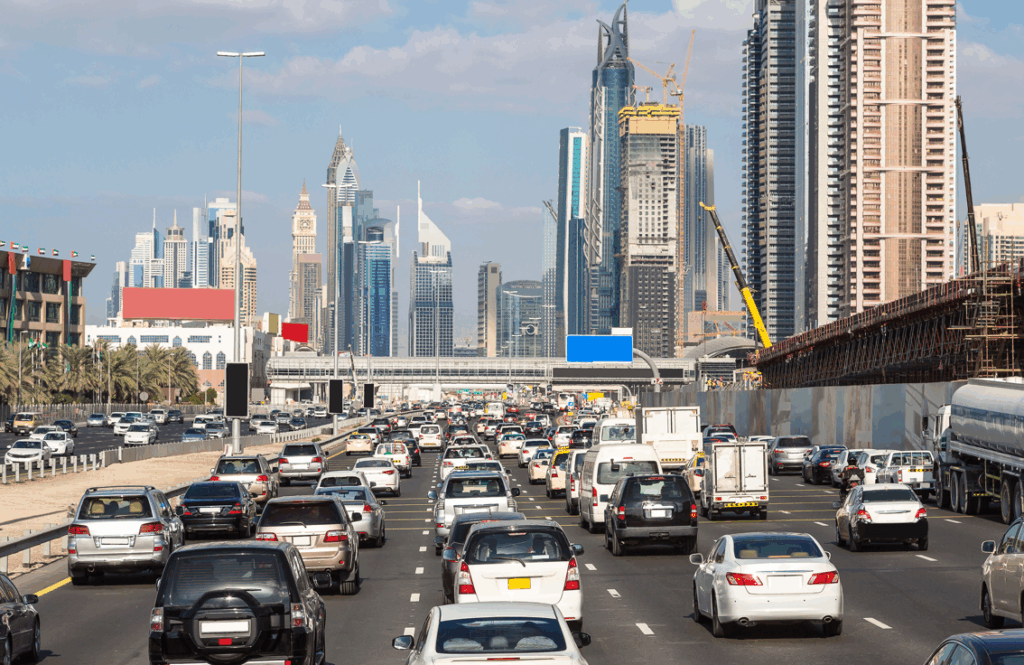A new study has revealed that 86% of UAE residents typically experience traffic congestion, with the situation worsening for 80% of respondents compared to last year. The findings are part of a wide-reaching survey conducted in June 2025 by an international online research agency, commissioned jointly by Al Wathba Insurance and RoadSafetyUAE.
The data highlights that traffic is most often encountered during afternoon and morning work commutes as well as morning school runs, signalling that routine weekday travel remains a key stress point for residents.
In a breakdown by emirate, Dubai and Sharjah top the list, with 91% and 90% of residents respectively reporting regular congestion. The issue appears to be escalating, particularly in Dubai, where 85% of respondents observed an increase in traffic from the previous year.
Public Perception Moves From Anecdote to Evidence
“This project aims to move the conversation about traffic beyond anecdotes and into a data-driven space,” said Muralikrishnan Raman, Chief Financial Officer at Al Wathba Insurance. “Traffic congestion affects almost everyone in the UAE. As a data-centric organisation, we felt it was crucial to work with RoadSafetyUAE to understand and address the root causes.”
Thomas Edelmann, Managing Director of RoadSafetyUAE, emphasised the importance of public input in shaping future mobility plans: “We’ve seen great progress from public stakeholders over the years. This study is our way of contributing meaningfully to the national conversation.”
Causes and Contributing Factors
The survey identified the top three reasons for congestion as:
- Too many vehicles on the roads (65%)
- Office start times being concentrated (54%)
- Simultaneous school start times (48%)
Additional concerns included:
- Heavy reliance on private cars (45%)
- Poor driving behaviour
- Low vehicle occupancy
- Insufficient work-from-home policies
- Limited infrastructure for alternative transport
All these factors, especially in rapidly urbanising areas, contribute to rising congestion levels across the Emirates.
Solutions Residents Support
When asked how the situation could be improved, respondents offered practical recommendations:
- 83% support improving public transportation, particularly rail and buses
- Promoting remote work models ranked among the top solutions
- Expanding the road network remains a priority for many
These findings suggest the public is aligned with national priorities around sustainable mobility, but want to see accelerated implementation of alternatives to private car use.
What’s Next?
The findings aim to inform government stakeholders, urban planners, and transport authorities as they prepare for another summer of high traffic volumes and long-term infrastructure planning.
Full details of the survey can be found in the ‘featured’ section of RoadSafetyUAE’s official website.
With population growth and urban development continuing across the Emirates, this research serves as a timely reminder: solving the UAE’s traffic crisis requires collective insight—and urgent, data-backed action.


14 Comments
Great beat ! I wish to apprentice while you amend your website, how could
i subscribe for a blog web site? The account aided me a
acceptable deal. I had been tiny bit acquainted of this your broadcast provided bright clear idea
Hurrah, that’s what I was seeking for, what a data! present here at this website, thanks admin of this web page.
Aw, this was an extremely nice post. Finding the time and
actual effort to generate a top notch article… but what
can I say… I procrastinate a whole lot and don’t
seem to get nearly anything done.
Everything is very open with a really clear explanation of the issues.
It was really informative. Your site is very useful.
Thank you for sharing!
Thanks for your personal marvelous posting! I quite enjoyed
reading it, you may be a great author. I will be sure to bookmark your blog and
may come back in the future. I want to encourage
you to ultimately continue your great work, have a nice morning!
Pretty! This was a really wonderful post.
Many thanks for providing these details.
I love your blog.. very nice colors & theme. Did you make this
website yourself or did you hire someone to do it
for you? Plz answer back as I’m looking to construct my own blog and would like to
know where u got this from. many thanks
Wow, fantastic blog layout! How lengthy have you
been running a blog for? you made running a blog glance easy.
The overall glance of your web site is magnificent, as neatly as the content!
Howdy! This is my 1st comment here so I just wanted to give a quick shout out and say I truly enjoy reading your articles.
Can you recommend any other blogs/websites/forums that go over
the same topics? Thanks for your time!
Do you have any video of that? I’d love to find out some additional information.
Hi, the whole thing is going fine here and ofcourse every one is
sharing facts, that’s actually fine, keep up writing.
Howdy! Would you mind if I share your blog with my facebook group?
There’s a lot of folks that I think would really enjoy your content.
Please let me know. Many thanks
This article gives clear idea in support of the new people of
blogging, that actually how to do running a blog.
I’m really impressed with your writing skills as well as with the
layout on your blog. Is this a paid theme or did you customize it yourself?
Either way keep up the excellent quality writing, it is rare
to see a great blog like this one these days.